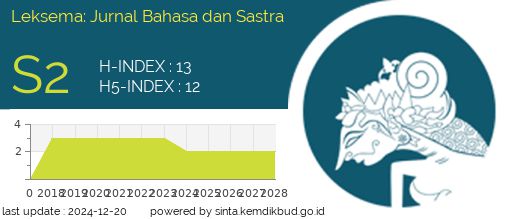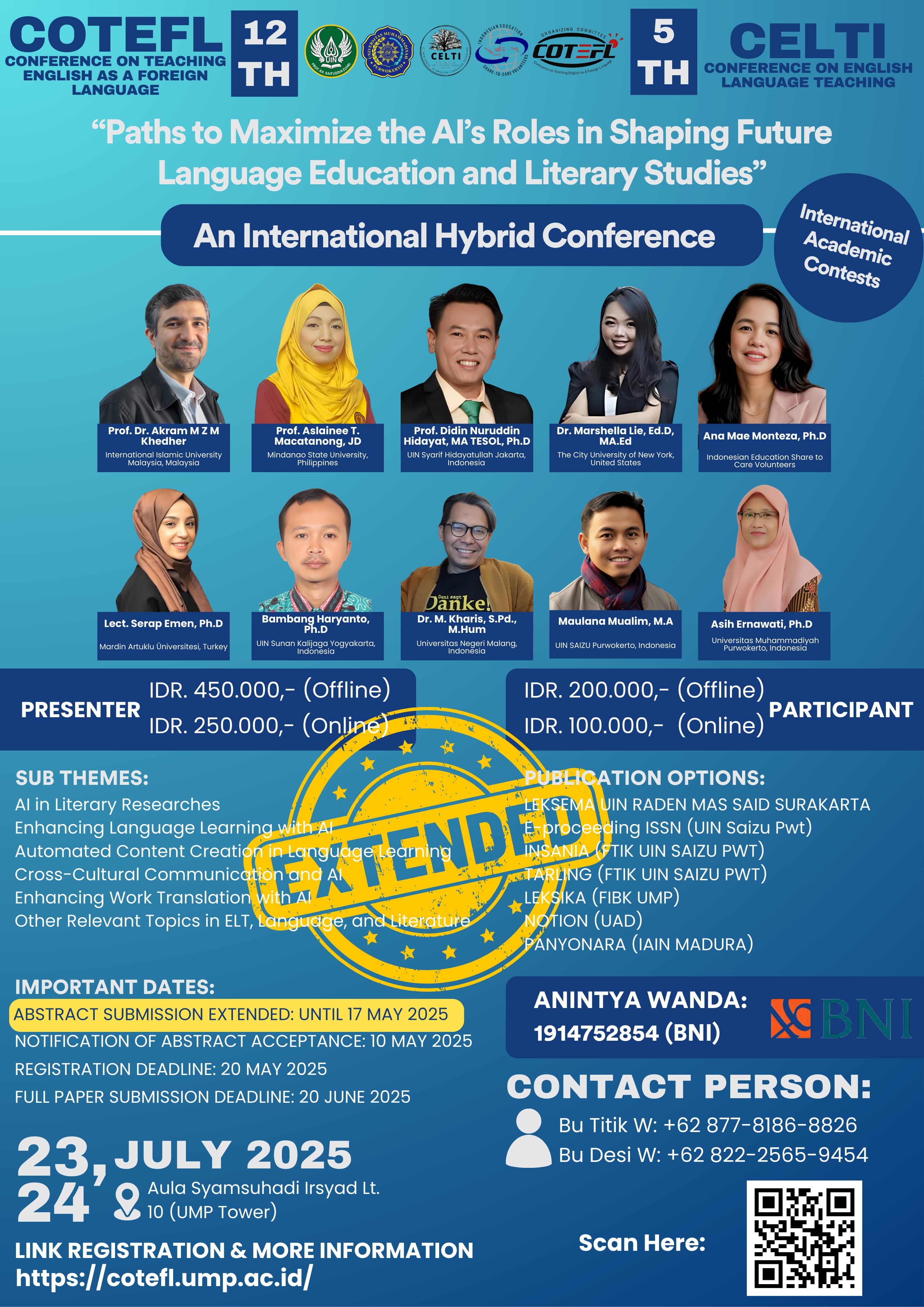STUDENTS' DIGITAL LITERACY IN ONLINE READING CLASS: A CRITICAL REFLECTION ON ENGLISH LANGUAGE LEARNERS
DOI:
https://doi.org/10.22515/ljbs.v6i1.2939Keywords:
students of English, critical digital literacy, online readingAbstract
Since literacy deals with the ability to read and write therefore information using technologies is really vast developed. In this digital era, students of English need to get accustomed to various disciplines, such as computer, ICT, and media literacy. Digital literacy deals with social practices and conceptions through digital texts. This reveals four main elements, i.e.: understanding cultural, social, and historical contexts of technology use; critical thinking and analysis; reflective practice; and facility with the functional skills and tools of digital technology production. This is a qualitative study which examined students’ critical digital literacy when they did online reading activity outside the class. The data were collected by using questionnaire. The subject of this research were the fourth semester students of English Department of Universitas Tidar Magelang. The findings navigate students with their critical digital literacy and understanding of the text with their background knowledge and interpret text effectively. This research implies to the concept of online class implementation, especially in reading class.
Downloads
References
Al-Hazza, Tami Craft. 2017. “The Tension in Pre-Service Teachers’ Explorations of Tablet Technology for Literacy Purposes: Positive Beliefs and Practical Shortcomings.†Teacher Development 21 (5): 704-21. https://doi.org/10.1080/13664530.2017.1338195
Alem, Yeshambel Tadele. 2019. “Critical Reflection as Motivational Strategy of Learning Critical Reading.†Journal of Language Teaching and Research 10 (4): 683. https://doi.org/10.17507/jltr.1004.03
Boluk, Karla & Sandro Carnicelli. 2015. “Activism and Critical Reflection through Experiential Learning.†Journal of Teaching in Travel and Tourism 15 (3): 242-51. https://doi.org/10.1080/15313220.2015.1059304
Burgess, Melissa L, Debra P. Price, and David C. Caverly. 2012. “Digital Literacies in Multiuser Virtual Environments among College-Level Developmental Readers.†Journal of College Reading and Learning 43 (1): 13-30. https://doi.org/10.1080/ 10790195.2012.10850360
Chen, Shin Feng. 2017. “Modeling the Influences of Upper-Elementary School Students’ Digital Reading Literacy, Socioeconomic Factors, and Self-Regulated Learning Strategies.†Research in Science and Technological Education 35 (3): 330-48. https://doi.org/10.1080/02635143.2017.1314958
Cote, Travis & Brett Milliner. 2018. “A Survey of EFL Teachers’ Digital Literacy: A Report from a Japanese University.†Teaching English with Technology 18 (4): 71-89. http://www.tewtjournal.org
Daley, Samantha G, Yang Xu, C. Patrick Proctor, Gabrielle Rappolt-Schlichtmann & Boris Goldowsky. 2020. “Behavioral Engagement among Adolescents with Reading Difficulties: The Role of Active Involvement in a Universally Designed Digital Literacy Platform.†Reading and Writing Quarterly 36 (3): 278-95. https://doi.org/10.1080/ 10573569.2019.1635545
Dashtestani, Reza & Shamimeh Hojatpanah. 2020. “Digital Literacy of EFL Students in a Junior High School in Iran: Voices of Teachers, Students and Ministry Directors.†Computer Assisted Language Learning 0 (0): 1-31. https://doi.org/10.1080/09588221. 2020.1744664
Grainger, Peter. 2020. “How Do Pre-service Teacher Education Students Respond to Assessment Feedback?†Assessment and Evaluation in Higher Education 45 (7): 913–25. https://doi.org/10.1080/02602938.2015.1096322
Hikmah, Durratul & Mohammad Sofyan Adi Pranata. 2019. “Reading Narrative By Semantic Mapping: A Strategy To Enhance Students’ Comprehension.†Leksema: Jurnal Bahasa dan Sastra 4 (2): 171. https://doi.org/10.22515/ljbs.v4i2.1785
Knight, Janine, Melinda Dooly & Elena Barberà . 2020. “Getting Smart: Towards Critical Digital Literacy Pedagogies.†Social Semiotics 0 (0): 1-24. https://doi.org/10.1080/ 10350330.2020.1836815
Liansari, Vevy & Ermawati Z. Nuroh. 2018. “Realitas Penerapan Literasi Digital Bagi Mahasiswa FKIP Universitas Muhammadiyah Sidoarjo.†Proceedings of the ICECRS 1 (3): 241–52. https://doi.org/10.21070/picecrs.v1i3.1397
McNaughton, Susan Maree. 2016. “Critical Reflection: Scaffolding Social Responsiveness for First-Year Students.†Reflective Practice 17 (3): 296-307. https://doi.org/10.1080/ 14623943.2016.1159551
Mulia, Vilya Lakstian Catra. 2016. “The Contributions of Literacy Skills to National Development.†Leksema: Jurnal Bahasa dan Sastra 1 (2): 111. https://doi.org/ 10.22515/ljbs.v1i2.101
Pangrazio, Luciana. 2016. “Reconceptualising Critical Digital Literacy.†Discourse 37 (2): 163-74. https://doi.org/10.1080/01596306.2014.942836
Park, Moonyoung & Jeong Bae Son. 2020. “Pre-service EFL Teachers’ Readiness in Computer-Assisted Language Learning and Teaching.†Asia Pacific Journal of Education 00 (00): 1-15. https://doi.org/10.1080/02188791.2020.1815649
Santisteban, Antoni, MarÃa Consuelo DÃez-Bedmar & Jordi CastellvÃ. 2020. “Critical Digital Literacy of Future Teachers in the Twitter Age (La Alfabetización CrÃtica Digital Del Futuro Profesorado En Tiempos de Twitter) (La Alfabetización CrÃtica Digital Del Futuro Profesorado En Tiempos de Twitter).†Cultura y Educacion 32 (2): 185–212. https://doi.org/10.1080/11356405.2020.1741875
Tan, Elaine. 2013. “Informal Learning on YouTube: Exploring Digital Literacy in Independent Online Learning.†Learning, Media and Technology 38 (4): 463-77. https://doi.org/10.1080/17439884.2013.783594
Theobald, Jacqui, Fiona Gardner & Natasha Long. 2017. “Teaching Critical Reflection in Social Work Field Education.†Journal of Social Work Education 53 (2): 300-311. https://doi.org/10.1080/10437797.2016.1266978
Wade, Carole. 1995. “Using Writing to Develop and Assess Critical Thinking.†Teaching of Psychology 22 (1): 24-28. https://doi.org/10.1207/s15328023top2201_8
Watulak, Sarah Lohnes. 2016. “Reflection in Action: Using Inquiry Groups to Explore Critical Digital Literacy with Pre-Service Teachers.†Educational Action Research 24 (4): 503–18. https://doi.org/10.1080/09650792.2015.1106957
Whitaker, Louise & Elizabeth Reimer. 2017. “Students’ Conceptualisations of Critical Reflection.†Social Work Education 36 (8): 946-58. https://doi.org/10.1080/ 02615479.2017.1383377
Downloads
Published
Issue
Section
License
Copyright (c) 2021 LEKSEMA: Jurnal Bahasa dan Sastra

This work is licensed under a Creative Commons Attribution-NonCommercial-ShareAlike 4.0 International License.
The copyright of the received article shall be assigned to the publisher of the journal. The intended copyright includes the right to publish the article in various forms (including reprints). The journal maintains the publishing rights to published articles.
In line with the license, the authors and users (readers or other researchers) are allowed to share and adapt the material only for non-commercial purposes. In addition, the material must be given appropriate credit, provided with a link to the license, and indicated if changes were made. If authors remix, transform or build upon the material, authors must distribute their contributions under the same license as the original.







